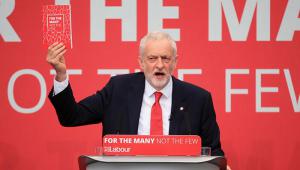This ought to be a pregnant moment for the Left. The project of free-market capitalism, liberated from the dead hand of state regulation, has unravelled.
The collapse of Lehman Brothers, the US’s fourth largest investment bank, will ensure the credit crunch deepens. If AIG, one of the world’s biggest insurance firms, had been allowed to go belly-up, the prospects would have been worse still.
The post-1970s world economy is built on the free flow of money through financial markets, with hedge funds, derivatives and other debt instruments supposedly ensuring funds are used as productively as possible. Once the flow ceases, it is like trying to run a fleet of aircraft without oil.
Over the past 30 years, private individuals as well as companies have become accustomed to the idea that, if a loan can’t be repaid, you raise another loan. As the then Prime Minister James Callaghan said, in a very different context, at the 1976 Labour conference: ‘I must tell you in all candour that that option no longer exists.’
So big state solutions, tightly regulated economies and ‘punitive taxation’ for the super-rich hedge fund managers who got it so wrong suddenly look more attractive, even mandatory. Bliss it should be in this dawn for a lefty to be alive, shouting ‘I told you so’ from every conference platform and TV studio.
And that is precisely the dilemma for Prime Minister Gordon Brown and Labour, as the party meets in Manchester for its annual conference. Brown has no programme, no ideas and no language to seize the moment. Along with all leading Labour politicians of his generation, he has spent 20 years coming to terms with the primacy of markets. New Labour treated the need to encourage and protect ‘wealth-creators’ — and to keep the state off their backs — as a given.
Throughout Brown’s chancellorship, he welcomed hedge funds and private equity firms, turning Britain into Europe’s biggest offshore tax haven. That, he thought, was the way to guarantee prosperity.
All the British Left’s intellectual energy has in turn been directed towards considering how the wealth generated by the market could be more widely distributed (tax credits, etc); how public services could flourish when collectivism had been discredited (foundation hospitals, city academies, etc); and how the ‘expertise’ and resources of the private sector could be tapped to restore the national infrastructure (the Private Finance Initiative and public-private partnerships).
That explains why Brown seems incapable of responding to the present crisis, and also why he has no compelling challenger. For ten years, all Labour’s doubts about its new direction were sublimated into the never-ending conflict between Brown and Tony Blair. The policy differences were on details, not fundamentals.
Should the top personal income tax rate be 40p or 50p? Should consumers have a wide choice of public service providers or should the government, as it were, pick the winners? Nine-tenths of New Labour theology was uncontested, the divinity of the market unchallenged. Since Brown’s accession to the premiership, he has not significantly altered even the one-tenth he professed to care about.
Now he is stranded. It is easier to ditch lifelong beliefs than to reverse an arduous intellectual journey. He has spent years convincing himself and others that there is no alternative to markets. Is he now going to say ‘whoops, sorry, comrades, I’ve been on the wrong track all this time’? It is possible for very nimble politicians to move Left or Right almost at will. Brown is not one of these. His political persona is built on his reputation as a man of conviction, strong values and deep thinking.
Almost every senior minister is caught in the same trap. Most have reputations as Blairites or Brownites, and the emergence of anyone from either camp will set off alarm bells in the other. David Miliband is young and cerebral enough to present a convincing — forgive the term — third way. But this former member of the Downing Street Policy Unit shows no sign of escaping his Blairite history: the first specific policy statement in his Guardian article in July stated: ‘We should have got on with reforming the NHS sooner.’
Jack Straw and, to a lesser extent, Alan Johnson are nimble, but neither young nor cerebral. Harriet Harman lacks the common touch. Jon Cruddas isn’t tarred as either Blairite or Brownite but has other things against him: inexperience (he’s never been a minister), Roman Catholicism, his name (let’s be honest) and lack of public recognition.
For these reasons, I think it more likely than not — I cannot be more categorical — that, whatever happens in Manchester, Brown will lead Labour into the 2010 election and inevitable defeat. Bizarrely, at this moment of greatest opportunity for the Left in more than 30 years, we shall probably end up with a Republican in the White House (it’s the skin colour, stupid) and a Tory in Downing Street.











